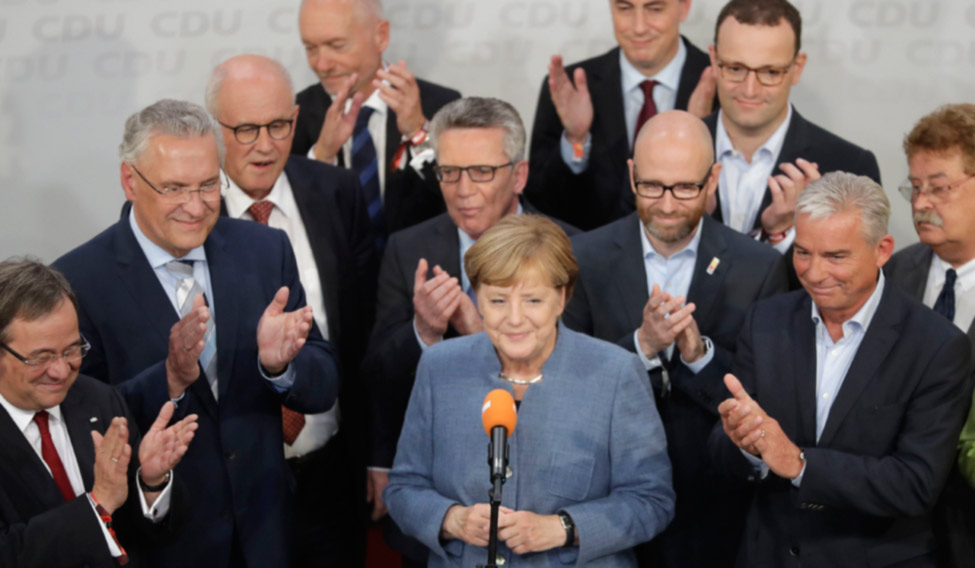Germany’s conservative chancellor Angela Merkel may have won her fourth consecutive national election, but she faces a huge challenge in trying to forge a three-way alliance between parties far apart on the political spectrum.
Despite winning most votes, Merkel’s bloc slumped to its worst result since 1949 and, just as significant in terms of government building, her current Social Democrat (SPD) coalition partners said they would go into opposition after slumping to 20.7 percent in projections, a post-war low.
Merkel herself indicated that she had only one other option to govern. ‘Jamaica’ is the name given to a tie-up between her conservative bloc, the pro-business Free Democrats (FDP) and environmentalist Greens, from the fact that island’s flag is made up of the black, yellow and green colours of the three parties.
Projections put the conservatives, comprising Merkel’s Christian Democrats (CDU) and Bavarian Christian Social Union (CSU) on 33.0 percent, the FDP on 10.6 and the Greens on 8.9 - enough for a workable majority.
But such an alliance, untested at a federal level, collapsed in January 2012 in the western state of Saarland after little more than two years, although it has been tried again since May in the northern state of Schleswig-Holstein.
On a national level, it would have to overcome deep differences on EU reform, tax, energy and immigration.
Both the Greens and FDP, fearing alienating their supporters with the compromises they would have to make, played down the likelihood of such a partnership.
The prospect of sharing power in Europe’s biggest economy will be a powerful incentive, however.
They may also feel a duty to ensure the far-right Alternative for Germany (AfD), whose anti-Islam and anti-immigrant rhetoric have for many raised uncomfortable echoes of Germany’s Nazi past, does not become the main opposition party.
“WE DON‘T WANT NEW ELECTIONS”
Fuelled by voter anger over Merkel’s decision in 2015 to admit around a million migrants, mostly fleeing conflict in the Middle East, the AfD won 13 percent of the vote to become the third-biggest bloc, and the first far-right party in the national parliament for over half a century.
“It will be very difficult but we all have a responsibility to our country. We don’t want new elections,” said conservative Interior Minister Thomas de Maiziere, adding that such a scenario would probably give further momentum to the AfD.
An ultimate coalition deal may be more about showing Germany’s commitment to democratic values than securing broad agreement on policy, where the pro-business FDP and the left-leaning Greens, in particular, are poles apart.
Greens co-leader Cem Ozdemir said his party would not participate in “anti-European populism” in a coalition with the conservatives and FDP.
Although the low-tax, red-tape-cutting FDP is traditionally a pro-European party, its young leader, Christian Lindner, has rejected ideas put by French President Emmanuel Macron for deeper euro zone integration.
“We want to reverse the trend for our country and, if it becomes apparent in talks that these goals can be achieved, then of course we will be available, but if not, it would be our task to go into opposition,” said Lindner.
He has also said Russia’s annexation of Crimea from Ukraine in 2014 might have to be accepted as a permanent provisional arrangement. It is hard to see how Merkel could swallow that.
The Greens emphasise climate policy and want a commitment to phase out coal power by 2030, which would be difficult for the other parties to agree to.
Refugee policy will also be challenging, especially with the FDP and Merkel’s Bavarian partners of the CSU taking a much harder line than the Greens on limiting immigration.
Berenberg economist Holger Schmieding argued that in the carve-up of ministries under a Jamaica coalition, Wolfgang Schaeuble, conservative finance minister since 2009, may have to yield his post to the FDP.
“(That) would tilt the domestic discussion a bit further towards serious income tax cuts,” he said.






